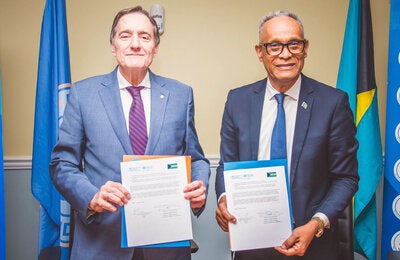

Influenza pandemics—which occur with remarkable, if unpredictable, regularity—raise important bioethical issues that need to be examined as part of countries' pandemic planning, said Benjamin Berkman, a faculty member in the Department of Bioethics at the U.S. National Institutes of Health, during a brown bag talk on Jan. 27 at the headquarters of the Pan American Health Organization/World Health Organization (PAHO/WHO).
Influenza pandemics—which occur with remarkable, if unpredictable, regularity—raise important bioethical issues that need to be examined as part of countries' pandemic planning, said Benjamin Berkman, a faculty member in the Department of Bioethics at the U.S. National Institutes of Health, during a brown bag talk on Jan. 27 at the headquarters of the Pan American Health Organization/World Health Organization (PAHO/WHO).

Berkman, who has served as a consultant for WHO on the ethical and legal aspects of public health interventions for pandemic influenza, said pandemics raise special concerns, including questions about the allocation of limited supplies of vaccines and antivirals among different population groups, the obligation (or not) of health workers and other essential personnel to report for duty during pandemics, and whether or not wealthier nations have the responsibility to make vaccines and antivirals available to developing nations at lower cost or despite limited supplies.
Berkman noted that, absent a clear domestic or international consensus on many key bioethical issues related to pandemics, more discussion was needed before any new pandemic breaks out."The magnitude of the risk is such that it demands a discussion about global equity," he said.



